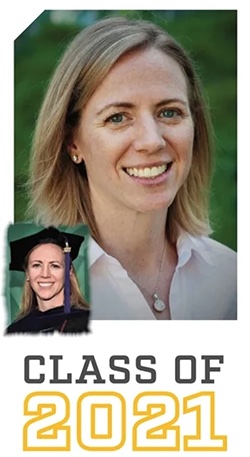Flexible Academics and Proximity to the Capital

by Laura Beth Ruppalt, Alumna of the Antonin Scalia Law School
Opportunity. Flexibility. Collegiality. These three words, more than any others, characterize my experience at George Mason University’s Antonin Scalia Law School.
I was drawn to Scalia Law, in part, by its smaller class sizes, proximity to Washington, D.C., and academic reputation. Even so, I hadn’t expected the many opportunities the school’s size, location, and diverse faculty would provide. My smallest class had nine students, my largest had about 50; I never felt lost among a sea of indistinguishable faces. And the proximity to D.C.—just a stone’s throw from the Arlington campus—provided unique access to experiential learning opportunities. Unlike students from other schools whose D.C. experiences are limited to the summer months, capital area internships were available year-round. I spent a semester working with a national association that advocated for the legal rights of the elderly. I had classmates who interned for federal judges, worked for members of Congress, and assisted federal agencies.
I was taught by nationally renowned constitutional law scholars whose writings regularly influenced our highest court; by up-and-coming academics who brought energy and insight to the study of evolving legal fields like financial regulation; and by experienced practitioners who in their professional careers prosecuted high-profile criminals, pursued complex commercial litigation, and defended essential civil rights. I even took a summer class from Supreme Court Justice Neil Gorsuch, who traveled with Scalia Law students to scenic Padua, Italy. It was a delightful mélange of the practical and the profound that has already impacted my short legal career.
But these opportunities were only possible because of the flexibility that Scalia Law offered. I pivoted to law after starting my career in engineering research, and I enrolled in the school’s part-time program so that I could continue working while completing my degree. Spending hours each evening learning the law—after a full day in the lab or office—was not for the fainthearted. But Scalia Law’s program made it manageable. After the first year of required courses, all classes—day and evening—were open to all students, allowing me to take afternoon classes on topics that interested me. And the flexible scheduling meant that I got to know enterprising full-time students who took evening classes to complement their daytime internships.
I appreciated that Scalia Law’s part-time program was not an afterthought to the full-time degree. We were taught by the same professors, held to the same high academic standards, and had the same opportunities to participate in law school activities: I was an editor for the George Mason Law Review, and I had part-time classmates who were research assistants, moot court champions, and student bar association representatives.
The most remarkable parts of my Scalia Law experience, however, were the people I met there. My classmates are some of the most accomplished people I know. Some were straight out of college. Others were experienced Capitol Hill staffers, military veterans, intelligence analysts, or medical professionals. They came to law school for different reasons but brought a common enthusiasm for learning the law. And while they pursued their studies with focus and dedication, they demonstrated a marked collegiality. Classmates were quick to offer their notes if you missed a class. Study groups were informal and inviting. And there were class-wide celebrations for personal and professional milestones.
The collegial tone was set at the top. Administrators and faculty were accessible, often joining us for receptions where we would discuss law and life over wine and hors d’oeuvres (or over beer and pizza). And the Career Services staff was tireless. With their help, I was able to connect with local practitioners, explore potential career paths, and secure my current position clerking for a federal judge on a circuit court of appeals.
I am grateful for the excellent legal education I received at Scalia Law, one that has opened a myriad of professional doors. But I am just as grateful for the opportunities that broadened my legal perspective, the flexibility that enabled me to graduate debt-free, and the collegiality that made law school not only bearable, but genuinely enjoyable.